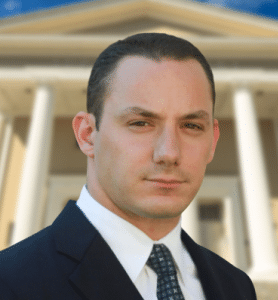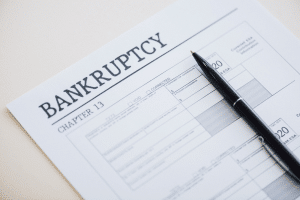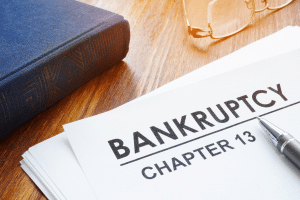
Filing for bankruptcy is something that most people will never want to experience. However, many unprecedented events may push individuals to file for bankruptcy. A small financial crisis may cause them to miss paying one or two payments to their creditors. An individual who falls behind on paying car loans, mortgage payments, and credit card bills will find it hard to catch up, even after recovering from the financial crisis. But, they are not left without a choice. People and business owners can dispose of their debts that they can't afford to pay, as provided in the Bankruptcy Code. A Florida Chapter 13 bankruptcy attorney will be your go-to person if you want to achieve a fresh financial start without paying off the entirety of your debt.
Our experienced Florida bankruptcy attorney can help you understand your case's legalities. Our Florida bankruptcy lawyers have helped many individuals get back on their feet financially and start to rebuild life after a financial crisis. To learn more, schedule a free consultation with our Chapter 13 bankruptcy lawyer by calling us at (888) 886-0020 or email us at emil@fleysherlaw.com.

You can easily get lost along the complex legal process if you are unfamiliar with bankruptcy law. A Florida bankruptcy Chapter 13 lawyer is well-versed in the field of bankruptcy law. So having them on your side will help you guarantee success. If you want to file for Chapter 13 bankruptcy, having no attorney could cost you more than you would save going it alone.
One of the essential things that you can benefit from hiring a bankruptcy lawyer is that they can quickly recognize any potential issues that may surface during your case, and they will make a plan accordingly. Here are some things our bankruptcy attorney can do for you:
They can consider or suggest other alternatives to bankruptcy if it is not the best choice for you.
They can help you decide which type of bankruptcy you should file. And they will carefully take into account your needs and wants and suggest a course of action to help you achieve those goals.
They can help you do the necessary preparation before filing bankruptcy.
They can complete the paperwork and schedules.
They can guide you through your bankruptcy case.
They provide complete and accurate testimony.
They can handle creditors violating the automatic stay
They can negotiate with your creditors.
They can modify a Chapter 13 repayment plan.
Your bankruptcy attorney can help resolve post-bankruptcy discharge violations if your creditors attempt to collect a debt that was discharged by bankruptcy.
They can provide guidance on rebuilding credit.
They can give you valuable tips that will help you take advantage of the offers you will receive shortly after your case ends.

Chapter 13 bankruptcy, also known as wage earner's bankruptcy, allows debtors to reorganize their debts through a bankruptcy plan. They can make arrangements with their creditors to pay off their debts within a specific amount of time, usually three to five years. In addition, if the debtor's current income is less than the state median, the plan can only be up to three years. Depending on other circumstances, the court can approve the plan for a longer duration.
With Chapter 13 bankruptcy, individuals are not required to sell off their assets to pay their debts, so long as they make their scheduled payments.
But before you can file Chapter 13, there are requirements you need to meet:
You must have a steady income. The bankruptcy court needs to ensure that you can afford your payment plan, in addition to your household obligations. If your income is deemed too irregular or too low, you are not allowed to file for Chapter 13.
You must meet certain debt limits. These numbers are subject to change. The limit of unsecured debts is less than $465,275 and less than $1,395,875 for secured debts. If your debts exceed these amounts, you won't likely be able to file for Chapter 13 relief.
Compared to Chapter 7, filing for Chapter 13 bankruptcy offers many advantages compared to liquidation. Additionally, it facilitates the opportunity to save homes and businesses from foreclosure. You would be able to put a stop to foreclosure proceedings. But of course, you are still required to make your mortgage payments.
Chapter 13 bankruptcy also allows you to reschedule secured debts (which do not include a mortgage). Furthermore, it allows you to prolong them throughout the course of the plan. Chapter 13 bankruptcy restructures your debts to give you ample time to pay them off.

You can speak with a bankruptcy attorney if you have questions or issues concerning Chapter 13 bankruptcy eligibility. The Law Offices of Emil Fleysher, P.A., a debt relief agency, can assist you in determining whether Chapter 13 is right for you. All areas of your credit, assets, liabilities, and more are reviewed to determine your eligibility.
As stated in the previous section, if your unsecured debt totals less than $465,275 and your secured debt totals less than $1,395,875, then you should be able to file Chapter 13.
The conditions in which you cannot file are as follows: a prior bankruptcy petition was dismissed due to the debtor's willful failure to appear before the court or neglected to receive credit counseling from an approved credit agency.

When a debtor files a Chapter 13 petition, the bankruptcy court will assign a case number and notify their creditors that they have filed for bankruptcy relief. Then their creditors must work within the court to resolve the debts they owe to them. Their creditors may not continue collecting or making new collection actions without the court's approval. As a result, filing a Chapter 13 bankruptcy stops foreclosures, collection lawsuits, wage garnishments, repossessions, and other debt collections immediately.
When you file bankruptcy, you must file a proposed Chapter 13 plan. Your proposed plan must provide the creditors and court with the specifics of how you want to reorganize your debts. Your proposed Chapter 13 plan payment should cover the payment for credit cards, car loans, medical debts, past-due alimony, back child support, and other unsecured debts.
The bankruptcy court must approve the proposed plan, which may necessitate amendments. Our experienced Florida Chapter 13 bankruptcy attorney has extensive experience calculating Chapter 13 bankruptcy plan payments. We can propose the lowest payment plan allowable by law to ensure you don't pay more than is required based on your financial situation.
Once the court approves the debtor's plan, they can continue paying their monthly plan payment to the Chapter 13 trustee until they complete the plan. The Chapter 13 trustee will disburse the payments to them in compliance with the terms of their approved plan. In most cases, the debtors pay a small percentage of the total unsecured debts through a repayment plan. Therefore, they could get rid of thousands of dollars in personal loans, credit card debt, medical bills, personal loans, and other debts.
The chapter 13 trustee will conduct a final review and submit an accounting to the bankruptcy court after all payments are received. Then the court will issue an Order of Discharge, relieving the debtor's legal liability to repay any discharged debts. In other words, unsecured creditors who receive only a small fraction of the money owed can't take further action to collect the remaining amount owed.
Chapter 13 bankruptcy plans will reorganize your debts into a few different categories. The following are some categories included in Chapter 13 payment plans:
These include tax obligations, alimony, criminal fines, child support, etc. These must be paid in full throughout the payment plan.
These will most likely need to be paid as part of your Chapter 13 plan payment if you want to keep the collateral assets attached to these debts.
After paying secured and priority debts, these debts must be paid with any remaining disposable income. By the end of your Chapter 13 plan, you may not have fully paid off your unsecured debts. However, you must show that you are putting any leftover income toward doing so.
This includes any property you cannot afford to keep but is not protected by exemptions under Florida law. You need to pay unprotected property value.
You can avail yourself of many benefits once your Chapter 13 bankruptcy filing is successful. Below are some of Chapter 13 advantages:
It can help you keep your home and car;
It can restructure car loans;
It can do lien stripping and cramdowns;
It can help you avoid contempt of court for support payments.

At The Law Office of Emil Fleysher, our bankruptcy attorneys are dedicated to diligently and compassionately helping clients resolve their debt problems and get a fresh start in Florida. Whether you live near Deerfield Beach, Lake Worth, Palm Beach, Stuart, or Port Saint Lucie, the Fleysher Law Firm can provide the information you need to formulate and choose a debt resolution strategy that works best for you. Whether utilizing Chapter 7 Bankruptcy, Chapter 13 Bankruptcy, Debt Settlement, Debt Defense, Asset Protection, or a combination, the bankruptcy and debt restructuring team at Fleysher Law will provide the quality, value, professionalism, and responsiveness you need to get a fresh start.
As an experienced and well-reviewed bankruptcy attorney, Emil Fleysher has filed thousands of bankruptcy cases for clients throughout Broward, Palm Beach, Martin, Saint Lucie, and Indian River Counties. Call, text, email, or message him for a free consultation to discuss your options and potential debt resolution strategies. Consultations are offered by phone, Zoom, or in-person. We have five conveniently located bankruptcy law offices in Deerfield Beach, Lake Worth, Palm Beach Gardens, Stuart, and Port Saint Lucie.
Here are the most asked questions about Chapter 13 bankruptcy in Florida:
When you file for Chapter 13 bankruptcy in Florida, you are not simply applying for a “get out of jail free” card. You still have to pay your debts, but you will follow a certain schedule to pay them. This will enable you to have ample time to pay off your debts.
A Florida Chapter 13 bankruptcy lawyer advocates on your behalf. They will draft motions and paperwork to be filed with the bankruptcy court. Depending on the type of bankruptcy filed, they will help settle debts with your creditors. Anyone unfamiliar with bankruptcy law can easily get lost as it can be complicated. Bankruptcy lawyers can help you understand the details of the law, tax laws, information on consumer finances, contracts, etc.
You will likely pay a minimum of $310 for the administrative and case filing fees. An option to pay the court on an installment basis is also available if necessary. Depending on the case’s complexity, you will most likely pay between $900 and $1500 in average cost to file bankruptcy with an attorney. Our Florida bankruptcy law office offers affordable payment plans, $0 down filing options, and free consultations to help you get the legal assistance you need.
Chapter 13 bankruptcy will stay on your credit for seven years. However, your credit score will improve over time with good financial decisions.
No. If you fall behind on your mortgage, Chapter 13 bankruptcy will restructure your late payment into your proposed repayment plan to help you catch up. It is essential to make regular plan payments to make sure that you remain in good standing.
If you suddenly experience a financial crisis, you have an option to modify your plan payment to pay a lower amount toward your monthly payment plan. However, if you get laid off from work or become disabled, you may be able to get your Chapter 13 bankruptcy discharged.

When you are weighed down by debts and want to know how you can get around them and get a fresh start, our Florida Chapter 13 bankruptcy attorney can help you. If you are planning to file a Chapter 13 bankruptcy or are unsure what to do about your bankruptcy case, you can discuss your situation with our Florida Chapter 13 attorneys. Contact us at (888) 886-0020 or email us at emil@fleysherlaw.com to schedule a free consultation protected by an attorney-client relationship. You can also submit your case details through our online contact form.

"*" indicates required fields